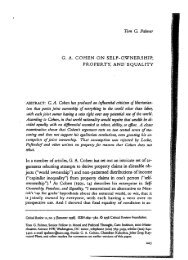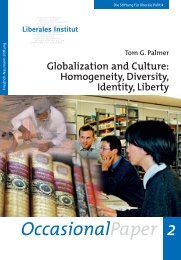Are Patents and Copyrights Morally Justified? - Tom G. Palmer
Are Patents and Copyrights Morally Justified? - Tom G. Palmer
Are Patents and Copyrights Morally Justified? - Tom G. Palmer
Create successful ePaper yourself
Turn your PDF publications into a flip-book with our unique Google optimized e-Paper software.
850 HarvardJournal of Law & Public Policy [Vol, 18<br />
tive or positive; patents or copyrights may actually decrease innovation,<br />
rather than increase it. 127<br />
Thus, the specific situation matters a great deal in such arguments.<br />
But this kind of utilitarian argument does not exhaust<br />
the range of possible utilitarian approaches. Here, I will simply<br />
contrast arguments of this sort, which I will call “X-maximization<br />
arguments” (with “X” st<strong>and</strong>ing in for utility, wealth, or<br />
some other welfare-related maxim<strong>and</strong>), with another sort of<br />
broad utilitarian concern: justice-as-order.’ 28 The former seeks<br />
to arrange property rights in such a way that some quantity is<br />
maximized; the latter seeks to create an overarching order<br />
within which human beings can realize theirvarious ends without<br />
suffering from uncertainty arising from scarce resources,<br />
social conflict, <strong>and</strong> violent predation.’ 29<br />
X-maximization arguments over intellectual property rights<br />
hinge on contingent matters of fact. The relevant facts may<br />
change; technology, social practices, <strong>and</strong> other factors cannot<br />
be held constant in the real world.’ 3 °Scarcity plays a vital role<br />
within such approaches. Innovations <strong>and</strong> research are scarce in<br />
the sense that they “use up” resources, <strong>and</strong> the allocation of<br />
these resources involves opportunity costs, alternative uses of<br />
the resources which are foregone. The problem, then, is to allocate<br />
property rights—including intellectual property rights—<br />
in such a way that the greatest net “X” (utility, wealth, <strong>and</strong> so<br />
on) is produced at the lowest cost.<br />
127. By diminishing pre-patent cooperation among researchers, for example, or<br />
through diminishing opportunities for playwrights to emulate William Shakespeare,<br />
who rewrote Thomas Kyd’s now-forgotten play “The Spanish Tragedy” <strong>and</strong> gave us<br />
“Hamlet.” See also Bittlingmayer, Property Rights, Progress, <strong>and</strong>the~4ircraftPatentAgreement,<br />
30J.L. Sc Ecom. 227 (1988).<br />
128. See H. SIDOWICK, THE METHODS OF ETHICS 440 (1981) (“What Hume. . , means<br />
byJustice is rather what I should call Order ).<br />
129. Aristotle seems to have used both arguments in his dispute with Plato overthe<br />
community ofpossessions. In his Politics he argued: “What belongs in common to the<br />
most people is accorded the least care: they take thought for their own things above all,<br />
<strong>and</strong> less about things common, or only so much as falls to each individually.” A&rs-<br />
TOThE, THE Pou’rics 57 (C. Lord trans. 1984). This corresponds, more or less, tojustice-as-”X-maximization.”<br />
He addresses justice-as.order later: “In general, to live<br />
together <strong>and</strong> be partners in anyhuman matter is difficult, <strong>and</strong>particularly things of this<br />
sort (owning common property].This is clear in partnerships offellow travellers, most<br />
of whom are always quarrelingas a result of friction with one another over everyday<br />
<strong>and</strong> small matters. Again, friction particularly ariseswith the servants we use most frequently<br />
for regular tasks.” Id. at 60.<br />
130. See, e.g., E. EI5ENS rEIN, THE PRINTING PREss AS AN AGENT OF CHANGE: COMMU-<br />
NICATIONS AND CULTURAL TRANSFORMATIONS IN EARLY-MODERN Euaopa (1979) (discussing<br />
the impact of the printing press on a variety of areas, including intellectual<br />
property).











